FY25 budget includes $30 million boost in revenue sharing; MAC to continue push in fall for dedicated trust fund
 In the wee hours of Thursday morning, the Legislature adopted a fiscal 2025 budget that includes a $30 million increase in county revenue sharing.
In the wee hours of Thursday morning, the Legislature adopted a fiscal 2025 budget that includes a $30 million increase in county revenue sharing.
This would bring overall county revenue sharing to $291 million, up from the $261 million enacted for fiscal 2024.
“We appreciate the $30 million, which will be on top of what counties received in 2024, though distributed differently,” said Stephan Currie, MAC executive director. “Also beneficial is the elimination of the County Incentive Program, which required counties to comply with reporting requirements for part of their revenue sharing. The process now is streamlined.
“Nevertheless,” Currie added, “counties still need the certainty of a Revenue Sharing Trust Fund, which we will be working to secure the passage of later this year.”
For many months, MAC has been working in concert with cities, villages and townships on a plan to establish a dedicated state account filled by a percentage of the state sales tax. Different versions of that plan had advanced in both legislative chambers, with the Senate version representing the best possible result for counties.
“We need to ensure the state properly shares revenue with locals, providing a growth factor and stability to local governments that count on these funds,” explained Deena Bosworth, director of governmental affairs. “The good news is we expect consideration of this policy reform to resume in the fall.”
For questions about MAC’s advocacy on the state budget, contact Deena Bosworth at bosworth@micounties.org.
Podcast 83 team reviews budget: New $30 million boost in revenue sharing comes with new distribution system
 A $30 million boost to county revenue sharing highlights the fiscal 2025 state budget. But this 11.5 percent increase to the revenue sharing total of $291 million will not mean every county will get 11.5 percent more, MAC’s Deena Bosworth explained in a special budget episode of Podcast 83.
A $30 million boost to county revenue sharing highlights the fiscal 2025 state budget. But this 11.5 percent increase to the revenue sharing total of $291 million will not mean every county will get 11.5 percent more, MAC’s Deena Bosworth explained in a special budget episode of Podcast 83.
The increase of $30 million will be distributed differently than traditional statutory revenue sharing payments. Those payments will be calculated based on an inverse relationship to the taxable value of your county, as compared to the rest of the state
“We don’t have the numbers broken out by county yet, or what that percentage increase is going to be for each county. But as soon as the Department of Treasury puts that together, we will make sure that all of you have it so you know what to anticipate,” Bosworth said.
“So, overall, a very healthy increase. It’s not one-time monies … it is ongoing, the way that it’s written,” Bosworth added.
On other budget fronts affecting counties:
Samantha Gibson noted a new $17 million for county prosecutors to address their hiring and staff retention crisis. “The distribution will go to 15 counties with the highest rates of violent crime per 1,000 residents,” Gibson said. “At this time, I do not have what that list of 15 counties is, but I’m sure we’ll have that very soon here.”
“There is $74.5 million in the transportation budget for 30 individual critical infrastructure projects,” said Madeline Fata, “so some of you might have been lucky enough to be on that list and have some projects coming to your communities.”
Fata also noted two absences from the budget:
- There are no state dollars for a pilot project on “mileage-based user fees” for road funding; instead, the state will pursue federal aid for that pilot.
- And the huge increase in tipping fees for solid waste that Gov. Gretchen Whitmer had sought was not adopted in the budget.
View the full episode, recorded on June 27, by clicking here.
Previous episodes can be seen at MAC’s YouTube Channel.
And you always can find details about Podcast 83 on the MAC website.
What’s in the FY25 state budget for counties?
 MAC’s advocacy team identified the following line items by service area affecting counties in the fiscal 2025 state budget.
MAC’s advocacy team identified the following line items by service area affecting counties in the fiscal 2025 state budget.
Judiciary/Public Safety
- County Jail Reimbursement Program
- Requires MDOC to administer county jail reimbursement program, which offers counties per diem payments for housing certain offenders in jails; $5 rate increase to each per diem rate
- MIDC
- $37.4 million to support grant distributions to district and circuit court funding units for the state’s share of the FY25 costs for MIDC standards 1-8
- $24.6 million for standards 1, 2, 3, 4, 5, 8
- $12.9 million for standards 6 and 7
- $37.4 million to support grant distributions to district and circuit court funding units for the state’s share of the FY25 costs for MIDC standards 1-8
- Kent and Macomb County Judgeships
-
- $305,500 for partial year costs of two new judgeships – Kent County district court judge and Macomb County probate court judge
-
- Local Prosecutor Support Grants
-
- $17 million for grants to offices of county prosecutors to reduce the average caseload per attorney
-
-
- Will be distributed to 15 counties with highest rates of violent crime per 1,000 residents
- Funding will be population of county multiplied by $7.50
-
- Medicaid Coverage for Incarcerated Individuals
-
- NOT included
- Operation Drive
-
- $1 million ($500,000 for Oakland County, $500,000 for district courts statewide) for a program to assist individuals with regaining driving privileges by providing guidance on how to address underlying issues that led to driver license suspension, guidance on how to maintain responsibility and guidance on how to address traffic tickets, warrants, court appearances and payment of fees and fines
- Juvenile Justice
-
- $10.4 million, 16 FTEs, in part used to support staffing at the two state residential facilities (Bay Pines and Shawono Center) to help relieve the bed shortage crisis. If additional state beds become available, county juvenile facilities can place their youth with the state and have open beds at the local level
Infrastructure
- Stormwater
- $10 million fin on-going funding for stormwater management planning grants and $300,200 in one-time funding
- All local governments are eligible for these grants
- Roads
-
- No state dollars for pilot project on mileage-based user fees
- $74.5 million for 30 “Critical Infrastructure Projects”
Environment
- No Increase in Landfill Tipping Fees
- EV Charging Infrastructure
- $25 million for Clean Fuel and Charging Infrastructure
- 40 percent for “environmental justice communities”
- Can be used for public transit
- $5 million for Renewable Energy and Electrification Infrastructure Enhancement and Development
- Grants to businesses, nonprofits and local governments for planning, developing, designing, acquiring or constructing renewable energy and electrification infrastructure projects
- $25 million for Clean Fuel and Charging Infrastructure
Elections
- $1.5 million to support counties with implementation costs associated with Proposals 1 and 2 and for financial disclosure investment grants
Health and Human Services
- Certified Community Behavioral Health Clinics (CCBHCs)
- $161.8 million, 12 FTEs to expand into additional counties (includes a study)
- Opioid Healing and Recovery Fund
- $10 million on a one-time basis for regional community health entities (PIPHs)
- Ground Emergency Medical Transport (GEMT)
- $500,000 (one-time funds) to create a system of recording and accepting Medicaid reimbursement for emergency transport services
- Medicaid Coverage for Incarcerated Individuals
- NOT included
- Runaway and Homeless Youth Grants
- $5.3 million to support program expansion ($3.2 million to 18 counties that are currently unserved by a runaway and homeless youth program, $1.1 million to 19 counties for infrastructure expansion, $1.1 million to 19 counties to upgrade technology and facilities)
- County Child Care Fund
- $9.1 million increase
- Foster Care Payments
- $16.9 million
- Housing
- $5 million for services to unhoused individuals in Genesee County
- $10 million for affordable housing in Genesee County
State agency releases energy siting guidance document
 Developers are encouraged to work with local governments in new recommendations made by the Michigan Public Service Commission (MPSC) on siting for renewable energy facilities. This week, the MPSC released its comprehensive recommendations for implementing Public Act 233, providing guidance on public meeting requirements, Compatible Renewable Energy Ordinances (CREO), site plans and more.
Developers are encouraged to work with local governments in new recommendations made by the Michigan Public Service Commission (MPSC) on siting for renewable energy facilities. This week, the MPSC released its comprehensive recommendations for implementing Public Act 233, providing guidance on public meeting requirements, Compatible Renewable Energy Ordinances (CREO), site plans and more.
Overall, the recommendations reflect much of the feedback provided by MAC during the drafting phase.
The MPSC clarified that only the affected local governments with zoning authority will need to adopt a renewable energy ordinance. It is urging developers to work directly with the local government, regardless of whether the government has adopted a CREO or a “workable ordinance.” A workable ordinance is an ordinance that is considered reasonable but does not match the standards prescribed by the new law.
There were some additions made by the MPSC that are not explicit in PA 233. For example, prior to breaking ground on a project, the developer must consult with local first responders and road commissioners, and they must agree to repair or replace any drainage systems or county roads damaged during construction.
The biggest discrepancy between the MPSC recommendations and MAC’s feedback pertains to intervenor grant funds. If a project is approved by the MPSC rather than a local government, each affected local will receive up to $75,000, but not more than $150,000 in total, to contest a case. MAC asked that any unexpended funds remain with the local government, as that is how grants traditionally operate. However, the MPSC recommends that funds not utilized be refunded to the applicant.
The MSPC is seeking one last round of feedback on these recommendations, due by July 17. It will be hosting a virtual public meeting on July 10 to discuss this proposal ahead of the feedback deadline. Next, MPSC staff will review the public comments and submit final guidance on Aug. 9. The new law will then take effect in November. (See the latest edition of Michigan Counties for expert advice on compliance with the new law.)
For more information on this issue, contact Madeline Fata at fata@micounties.org.
 Staff investments coming from budget for medical care facilities
Staff investments coming from budget for medical care facilities
Investments in staff and training highlight the fiscal 2025 state budget items affecting the membership of the Michigan County Medical Care Facilities Council:
- $1.9 million GF/GP and authorization for 12 FTE positions to hire additional staff to offset increased workloads associated with health and long-term care facilities and to conduct surveys and investigations of nursing homes. The increased staffing would assist with federal performance measure compliance.
- $1.1 million of state restricted funding authorization from the Nurse Aide and Medication Aide Registration Fund and authorization for 7 FTE positions to hire additional staff to administer medication aide training and certification requirements created by Public Act 273 of 2023. Funding would also be used to develop and implement a medication aide training curriculum, testing requirements, and to improve regulatory compliance.
- $9.2 million GF/GP, on a one-time basis, to provide student loan repayment for eligible nurses employed by public and private health facilities in the state.
- $49 million for long-term care direct care wages ($14 million from federal dollars, $35 million from GF/GP).
- $10.4 million to cover increased costs associated with utilizing contracted nursing staff.
- $28.7 million to provide a 20-cent per hour direct care wage increase.
 MAC holiday information released
MAC holiday information released
MAC’s Lansing offices will be closed July 4-5 to observe the Independence Day holiday. Normal office hours will resume at 8 a.m. on Monday, July 8.
There will not be a Legislative Update email blast on July 5. The next Legislative Update email will be released on Friday, July 12.
To see the complete text of the Declaration of Independence, click here.
 Staff picks
Staff picks
- In Michigan, ‘fixing the damn roads’ got really darned expensive (Bridge Michigan)
- Fiscal brief: Motor fuel taxes, sales tax on motor fuels and methods of tax collection (Michigan House Fiscal Agency)
- Residents could be tasked with paying for Michigan dam rebuild after court ruling (MLive)
- California voters prefer term limits for local offices (Governing)

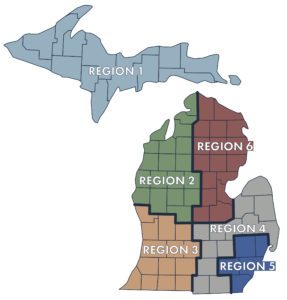 County commissioners interested in serving on the MAC Board of Directors have until Aug. 23, 2024, to file for elections to fill five seats on the Board at the 2024 Michigan Counties Annual Conference.
County commissioners interested in serving on the MAC Board of Directors have until Aug. 23, 2024, to file for elections to fill five seats on the Board at the 2024 Michigan Counties Annual Conference. Legislation to allow certain prisoners to earn productivity credits to reduce their sentence received its first hearing this week in the Senate Committee on Civil Rights, Judiciary, and Public Safety.
Legislation to allow certain prisoners to earn productivity credits to reduce their sentence received its first hearing this week in the Senate Committee on Civil Rights, Judiciary, and Public Safety. Legislation to expand the available options of opioid “
Legislation to expand the available options of opioid “ All budget subcommittee chairs, save those responsible for the School Aid budget, have received their target numbers for their respective fiscal 2025 budgets. Targets are key to negotiating the final version of state budget between the legislative chambers and the administration and setting them is the next to last step to completing the budget for the year starting Oct. 1.
All budget subcommittee chairs, save those responsible for the School Aid budget, have received their target numbers for their respective fiscal 2025 budgets. Targets are key to negotiating the final version of state budget between the legislative chambers and the administration and setting them is the next to last step to completing the budget for the year starting Oct. 1. County officials need to be taking concrete actions now to prepare for the November implementation of a controversial state law on siting renewable energy facilities, a University of Michigan analyst
County officials need to be taking concrete actions now to prepare for the November implementation of a controversial state law on siting renewable energy facilities, a University of Michigan analyst  A booth at MAC’s 2024 Legislative Conference has started the process for claims that could mean thousands of dollars in currently unclaimed property.
A booth at MAC’s 2024 Legislative Conference has started the process for claims that could mean thousands of dollars in currently unclaimed property. Strengthen your team and improve your county’s future performance by giving your emerging all-stars — or yourself — an opportunity to level up.
Strengthen your team and improve your county’s future performance by giving your emerging all-stars — or yourself — an opportunity to level up.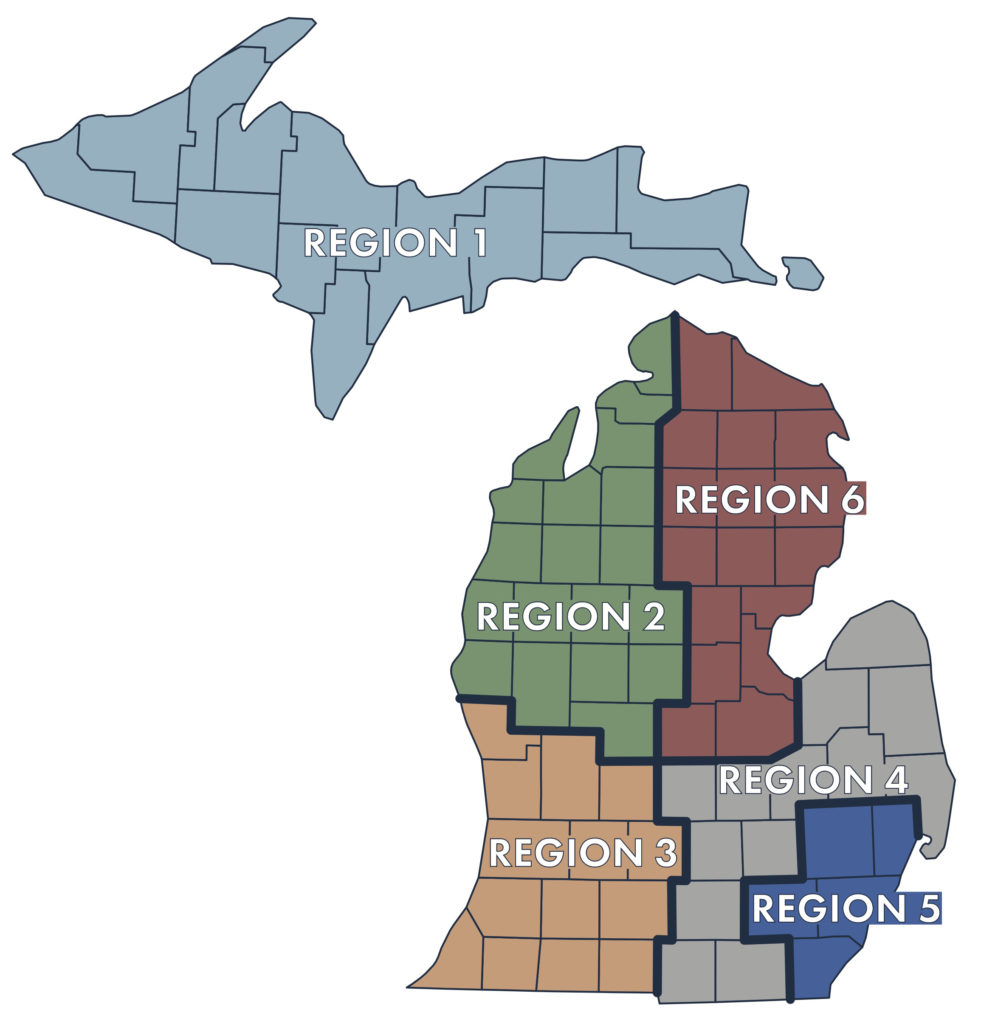 County commissioners interested in serving on the MAC Board of Directors have until Aug. 23, 2024, to file for elections to fill five seats on the Board at the 2024 Michigan Counties Annual Conference.
County commissioners interested in serving on the MAC Board of Directors have until Aug. 23, 2024, to file for elections to fill five seats on the Board at the 2024 Michigan Counties Annual Conference.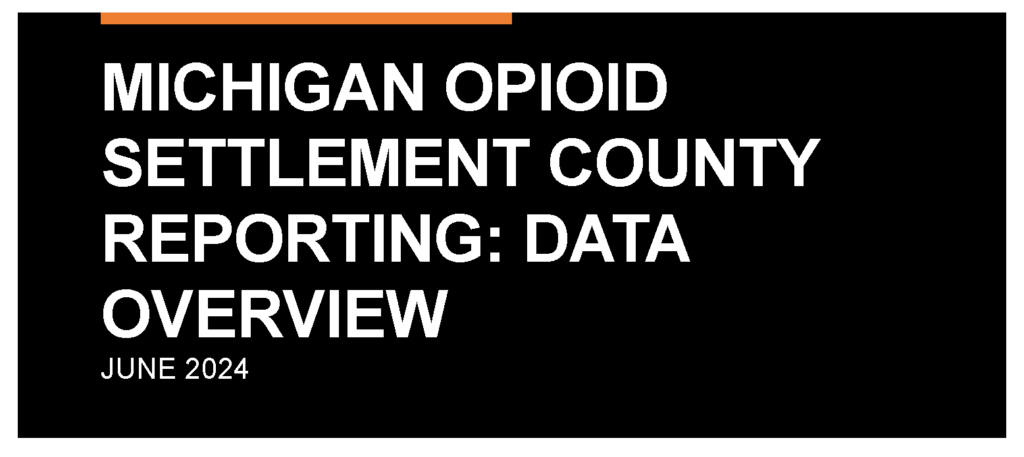
 A huge state fund for community investments, accessible by counties and others, was suddenly and unexpectedly eliminated from legislation in a House committee this week.
A huge state fund for community investments, accessible by counties and others, was suddenly and unexpectedly eliminated from legislation in a House committee this week. An amended version of the “Michigan Voting Rights Act,”
An amended version of the “Michigan Voting Rights Act,”  A state plan to alert delivery of mental health services should be considered, MAC and one of its affiliates said this week.
A state plan to alert delivery of mental health services should be considered, MAC and one of its affiliates said this week.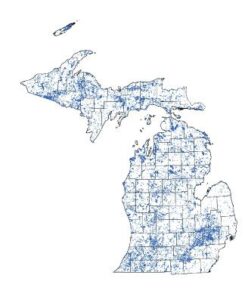
 Legislation to ease financial limitations on the maintenance of drains was voted out of a House committee this week.
Legislation to ease financial limitations on the maintenance of drains was voted out of a House committee this week. While the Legislature’s work on the fiscal 2025 state budget remains behind closed doors, MAC’s advocates at the State Capitol have been shepherding forward policy reforms to boost county hiring, investments in public services and assist jurors.
While the Legislature’s work on the fiscal 2025 state budget remains behind closed doors, MAC’s advocates at the State Capitol have been shepherding forward policy reforms to boost county hiring, investments in public services and assist jurors. The
The  MAC gave its support this week at the State Capitol to legislation to revamp state economic development spending.
MAC gave its support this week at the State Capitol to legislation to revamp state economic development spending. A $6 billion economic development package with a focus on public transit was unveiled before a House panel this week.
A $6 billion economic development package with a focus on public transit was unveiled before a House panel this week.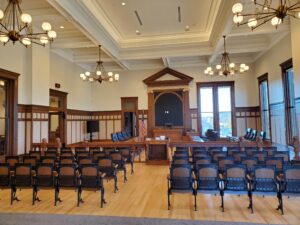 County departments may need to conceal judge’s personal information under proposed legislation.
County departments may need to conceal judge’s personal information under proposed legislation. 
 County leaders have free access to an upcoming cybersecurity training unit sponsored by the National Association of Counties:
County leaders have free access to an upcoming cybersecurity training unit sponsored by the National Association of Counties: “Partnership for Healthy Cities is hosting Overdose Prevention Webinar: Partnering with Community to Enhance Overdose Prevention Strategies” will be held on Monday, June 17 at 1 p.m. Eastern.
“Partnership for Healthy Cities is hosting Overdose Prevention Webinar: Partnering with Community to Enhance Overdose Prevention Strategies” will be held on Monday, June 17 at 1 p.m. Eastern.




